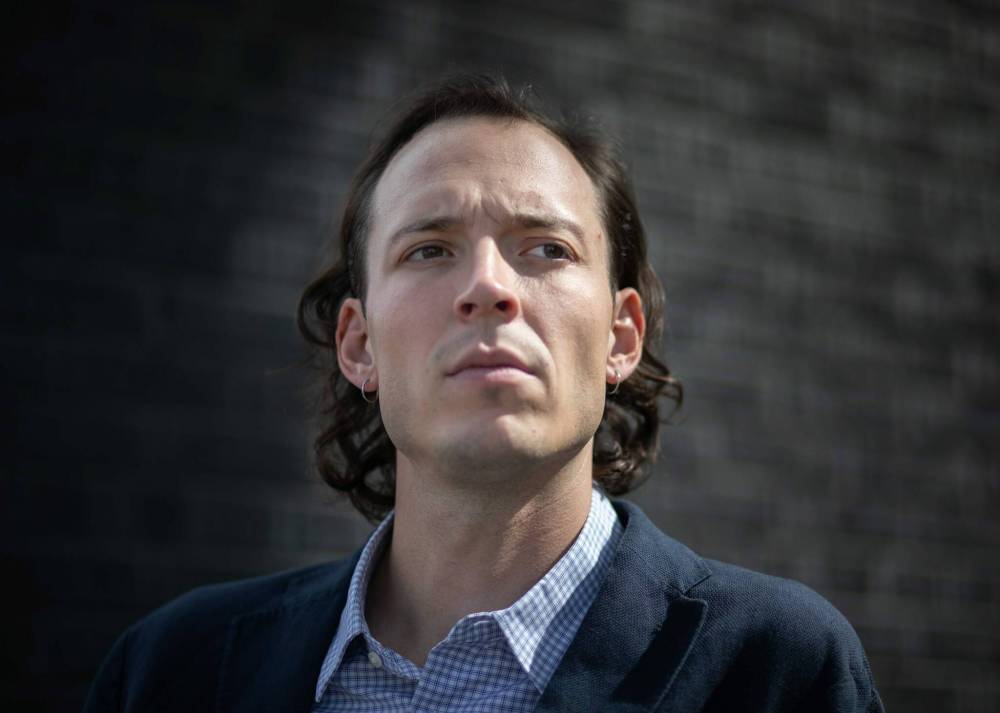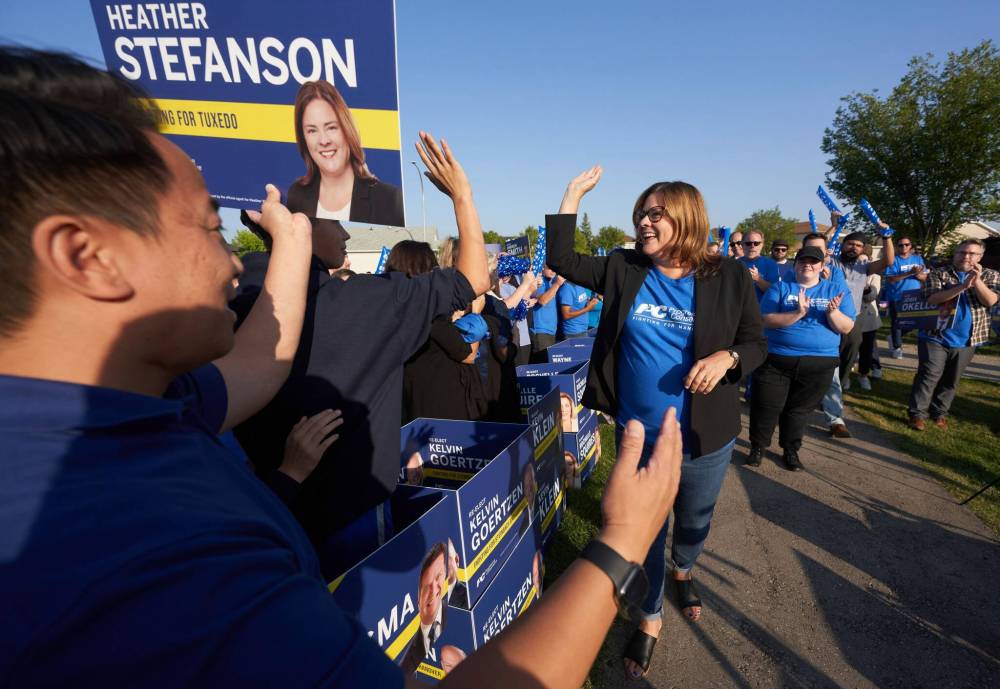Parties’ tax cuts threaten services, think tank says
Advertisement
Read this article for free:
or
Already have an account? Log in here »
To continue reading, please subscribe:
Monthly Digital Subscription
$0 for the first 4 weeks*
- Enjoy unlimited reading on winnipegfreepress.com
- Read the E-Edition, our digital replica newspaper
- Access News Break, our award-winning app
- Play interactive puzzles
*No charge for 4 weeks then price increases to the regular rate of $19.95 plus GST every four weeks. Offer available to new and qualified returning subscribers only. Cancel any time.
Monthly Digital Subscription
$4.99/week*
- Enjoy unlimited reading on winnipegfreepress.com
- Read the E-Edition, our digital replica newspaper
- Access News Break, our award-winning app
- Play interactive puzzles
*Billed as $19.95 plus GST every four weeks. Cancel any time.
To continue reading, please subscribe:
Add Free Press access to your Brandon Sun subscription for only an additional
$1 for the first 4 weeks*
*Your next subscription payment will increase by $1.00 and you will be charged $16.99 plus GST for four weeks. After four weeks, your payment will increase to $23.99 plus GST every four weeks.
Read unlimited articles for free today:
or
Already have an account? Log in here »
Hey there, time traveller!
This article was published 08/09/2023 (849 days ago), so information in it may no longer be current.
Manitoba’s two leading political parties are accused of proposing massive tax breaks and changes that could spur cuts to services while lining the pockets of the wealthiest taxpayers.
The Canadian Centre for Policy Alternatives-Manitoba says tax changes promised by both the NDP and Progressive Conservatives will punch holes in the budget for education, health care and social services.
Researcher Niall Harney said the Tory plan to halve the tax rate from to 5.4 per cent from 10.8 per cent on Manitoba’s lowest income tax bracket could cost the province up to $981 million by 2027.

JESSICA LEE / FREE PRESS FILES
The centre used Statistics Canada’s ‘social policy simulation database and model’ to evaluate the impact of the tax cut on the province’s finances Niall Harney said.
“The full cost of this proposal needs to be brought out to the public,” said Harney, the think-tank’s Errol Black Chair in Labour Issues. “We’re talking about a massive change that transforms the way that we can pay for core services.”
The centre used Statistics Canada’s ‘social policy simulation database and model’ to evaluate the impact of the tax cut on the province’s finances following the PC campaign kickoff announcement on Tuesday, Harney said.
It allows users to tweak existing tax programs and see how changes would affect personal taxation and cash transfer systems, according to Statistics Canada.
The PCs estimated the tax cut will reduce provincial revenue by $151 million annually as it lowers the tax rate by 1.35 per cent over four years, costing the government about $600 million by 2028. The average taxpayer could save up to $1,900 by 2028, the PCs estimate.
However, Harney disputed that.
The proposed tax cut would cost the province up to $981 million by 2027 and only save the average taxpayer about $953 when the changes are run through Statistics Canada’s model, Harney said. The Free Press could not independently verify the results.
Neither Harney nor the PC party could explain the discrepancy between the Tories’ forecast and the model’s estimated costs. However, assuming half of the one million Manitobans who file taxes get a $1,900 tax break in 2028, it would cost the province over $900 million, Harney said.
“I don’t see it being credible that this kind of tax cut is going to create a huge growth in the economy,” he said. “At the same time, we’re seeing economic storm clouds on the horizon.”
There are signs of an economic slowdown and federal transfer payments could change if there is a change in government in Ottawa, Harney said. The Manitoba government’s current budget also forecasts spending to outpace revenue for the next three years.
“We’re putting the Manitoba treasury in a very precarious spot if we’re cutting our capacity to raise our own funds so dramatically.”
Taking into consideration other available credits, people who earn less than $47,000 a year would receive savings in the range of $15 to $1,168, representing just 20 per cent of the program’s cost, according to the analysis.
Such policies deepen economic inequality and do little to help people who struggle the most with the cost of living, Harney argued.
“It’s possible that what they hope that translates to is more consumer spending, which will increase economic activity, increase investment and other tax revenues,” he said. “But what we really see around the world is that when inequality increases dramatically, it becomes a significant drag on the economy.”

DAVID LIPNOWSKI / WINNIPEG FREE PRESS Progressive Conservative Party of Manitoba leader and Premier of Manitoba Heather Stefanson meets and greets supporters at Kirkbridge Park Wednesday September 6, 2023.
Shannon Martin, who is not seeking re-election and is a PC campaign spokesman, said the party is confident in its numbers and appreciates CCPA-Manitoba’s perspective.
“We are helping Manitobans make ends meet, and making our province more attractive so we can grow our economy, which creates more revenue for the services Manitobans rely on,” he said in a statement, adding the party will have more to say about its plans.
Meantime, Harney said the NDP’s pledge to keep the fiscal framework laid out by PC government in its budget and the associated tax breaks and rebates will also increase income inequality.
Combined with the party’s pledge to give Manitobans a $165-million gas tax holiday and balance the budget in four years, the think-tank predicted an NDP government would have “little fiscal room to increase spending on core services without cuts to other budget items.”
On Friday, NDP Leader Wab Kinew disagreed with the analysis, saying his party will not cut services that voters rely on. He didn’t offer any additional details about the party’s plan to boost revenue.
“We look forward to continuing to lay out each of the aspects of our platform — health care, affordability initiatives — as we’ve been doing… and of course once all of these commitments are released, then we’ll also revisit our costing once again when we put out our platform,” he said.
Harney said it’s difficult to see where the parties will find the money to make good on their commitments.
“It doesn’t leave them with a lot of levers to raise revenue,” he said.
The provincial election is Oct. 3.
danielle.dasilva@freepress.mb.ca














